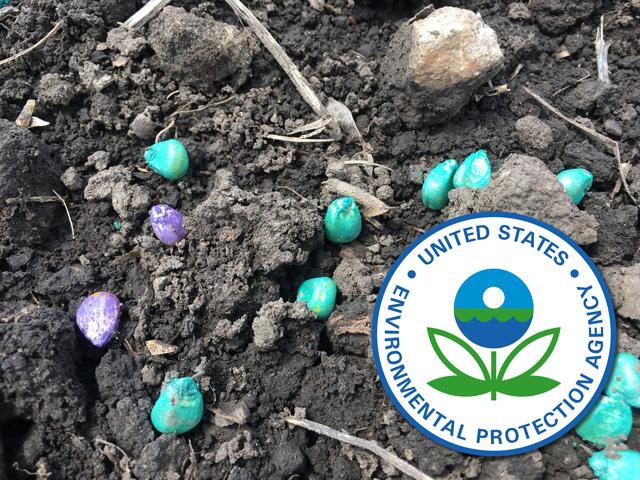EPA Sued Over Seed Treatments
Environmental Groups Sue EPA Over Lack of Action on Seed Treatment Petition
ROCKVILLE, Md. (DTN) -- EPA has not yet responded to a 2017 petition by environmental groups, demanding the agency fully regulate pesticide-treated seed.
Now, in a lawsuit filed Dec. 15, those groups are asking a federal court to order the agency to act.
At issue is a 2017 rule-making petition filed by the Center for Food Safety, which argued that EPA should regulate pesticide-treated seeds as pesticides. Currently, EPA says this kind of pesticide use falls under its "Treated Article exemption," and exempts treated seed from full regulation. The agency initiated a public comment period on the petition back in 2018, which garnered over 16,000 comments, but has since stalled on it.
In June 2021, in response to a DTN story on the lack of regulation and environmental costs of seed treatments, EPA stated that the agency was "working on a response" to the 2017 petition, but no action has been taken yet.
That constitutes an "unlawful delay," the plaintiffs of this new lawsuit wrote in their complaint, now in front of the U.S. District Court for the Northern District of California.
P[L1] D[0x0] M[300x250] OOP[F] ADUNIT[] T[]
In the complaint, the plaintiffs -- the Center for Food Safety and the Pesticide Action Network -- allege that EPA's refusal to act on their petition has allowed "irreparable environmental harms" from treated seed to continue, including a recent environmental crisis in Mead, Nebraska, after an ethanol plant mishandled discard treated corn seed and its ethanol byproducts and wastewater. (See more on that from DTN here: https://www.dtnpf.com/….)
The plaintiffs also note that EPA has never formally codified its decision to exempt pesticide-treated seed, which allowed it to dodge a past lawsuit filed by the same plaintiffs back in 2016. Instead, EPA's continued exemption of treated seeds relies on a 2013 guidance document on investigating pesticide-related bee deaths.
In the interim, seed treatment use has increased significantly, with treated seed planted on roughly 180 million crop acres each year. Since the neonicotinoid insecticides coated on the seed are water-soluble and can slough off the seed, these pesticides have surfaced in mammals, birds, insects and many waterways, as well as human urine, the plaintiffs note in their lawsuit. (See more from DTN on the growing concerns over these environmental exposures from treated seed here: https://www.dtnpf.com/….)
In the past, EPA has used the treated articles exemption to exempt other pesticide-coated items, such as lumber or shower curtains, from full regulation.
But seed treatments include systemic pesticides that are taken up into plant tissue and are thus marketed as protecting both the seed and the growing young plant from insects and disease -- a fact that the plaintiffs in the lawsuit have seized upon.
"Because the coated seeds are not treated primarily to protect the seed itself, but rather to protect the growing plant, they cannot be properly exempted as 'treated articles' under the regulation," the lawsuit reads. "As a result, EPA has completely failed to assess the risks of these unregulated pesticides. It has also never provided the public with any justification for its exemption or codified that practice in its regulations."
The plaintiffs ask the court to order EPA to respond to the 2017 petition within 90 days.
At the time of publication, EPA had not yet responded to DTN's inquiries on this lawsuit.
See the lawsuit here: https://www.centerforfoodsafety.org/….
See the original 2017 petition from the Center for Food Safety here: https://www.epa.gov/….
Emily Unglesbee can be reached at Emily.unglesbee@dtn.com
Follow her on Twitter @Emily_Unglesbee
(c) Copyright 2021 DTN, LLC. All rights reserved.





